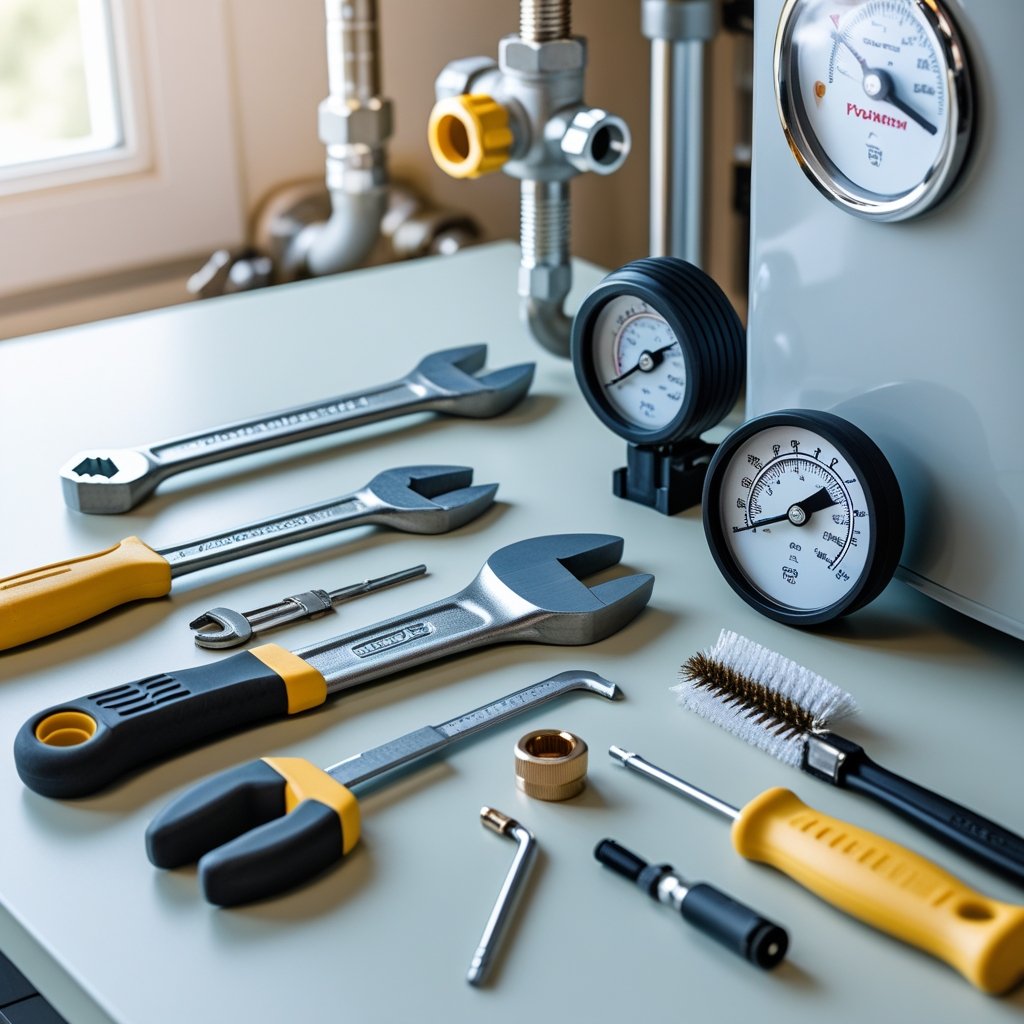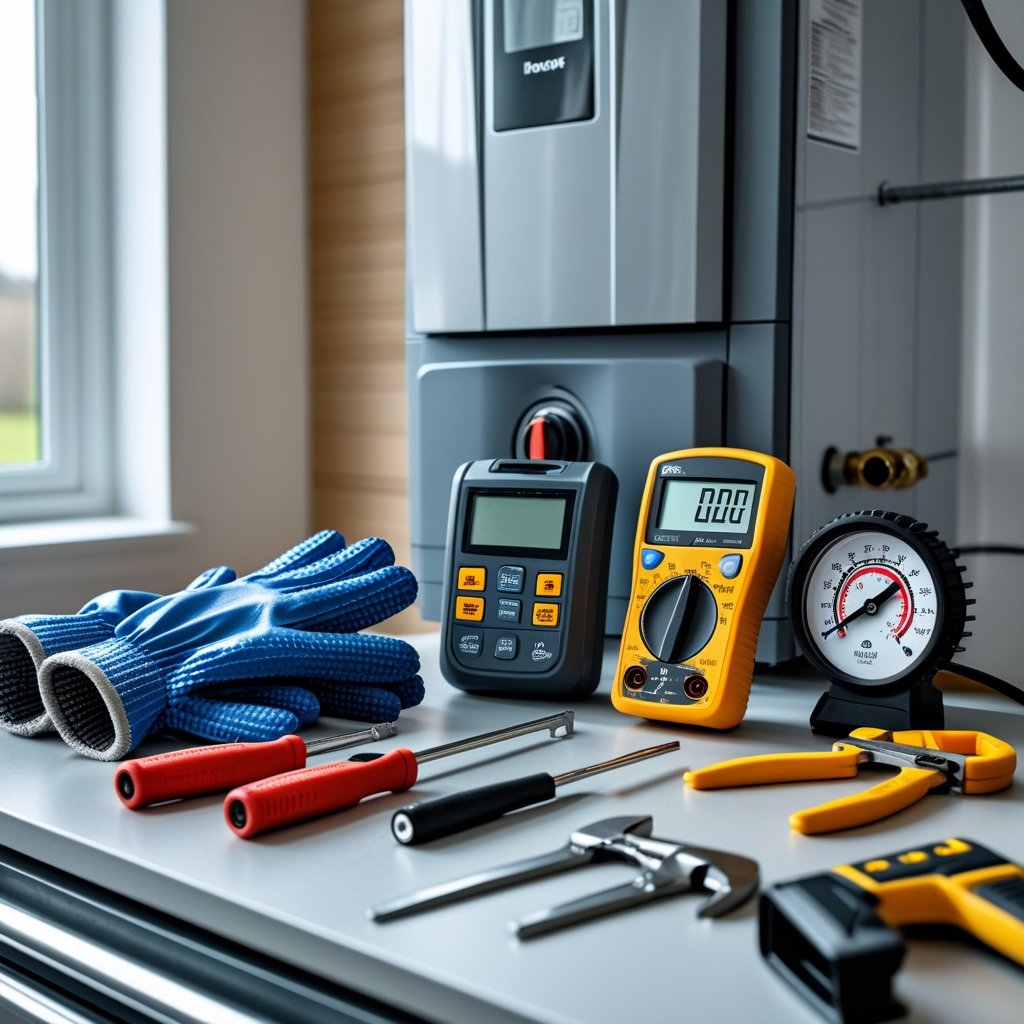Having the right boiler maintenance tools at home helps homeowners address minor issues quickly and ensures their heating system remains efficient and reliable. Items like adjustable spanners, pressure gauges, and flue brush sets are essential for routine checks and basic upkeep tasks such as tightening connections or cleaning components. Simple diagnostic tools can help spot problems early and may prevent costly repairs later.

Understanding which tools are truly necessary avoids unnecessary spending and makes it easier to manage basic maintenance safely. Investing in quality equipment such as pipe cutters, cleaning brushes, and gas leak detectors gives homeowners confidence in handling straightforward maintenance tasks on their own.
Staying prepared with these essentials can also be a time-saver, reducing the need for emergency callouts for minor problems. Readers looking to build an effective toolkit for their boiler can explore more about the essential boiler maintenance tools every homeowner should have and how these help keep their system working efficiently.
Fundamental Tools For Boiler Maintenance

To keep a household heating system in good working order, having the right tools is essential. These basic items help ensure safe operation, improve efficiency, and reduce the risk of common faults.
Radiator Key
A radiator key is used to bleed radiators, releasing trapped air that reduces heating efficiency. When radiators are cold at the top or make gurgling sounds, it is often due to air pockets in the system.
Using a key to bleed radiators restores efficient water flow and ensures even heat distribution. The key is a small, inexpensive tool but plays an important role in maintaining the entire heating system. Homeowners should bleed their radiators at least once a year, usually before the colder months, to guarantee optimal boiler efficiency.
Always turn off the heating before bleeding to avoid hot water accidents. Wipe up any excess water and ensure the pressure is checked afterwards so it remains in a safe operating range. Guides on radiator bleeding and tool choices are found with essential boiler repair tools.
Adjustable Spanner
An adjustable spanner is a versatile tool used during various boiler maintenance tasks. It fits different sizes of nuts and bolts, making it ideal for tightening or loosening connections on pipes, valves, and fittings.
Homeowners may need a spanner when replacing valves, tightening joints, or carrying out small repairs around the boiler and connected heating system. Choosing a quality, smooth-operating spanner provides better grip and control, reducing the risk of damaging components.
Keeping an adjustable spanner in the toolkit enables prompt action in the event of leaks or other minor boiler issues. It forms part of the essential toolkits for boiler care and helps maintain safe, reliable home heating.
Essential Safety Equipment

Using the correct safety equipment is crucial when handling boiler maintenance. Proper protection helps safeguard against potential hazards such as carbon monoxide exposure, burns, and eye injuries.
Carbon Monoxide Detector
A carbon monoxide detector is one of the most important pieces of safety equipment in any home with a boiler. Carbon monoxide (CO) is a colourless, odourless gas that can be deadly if inhaled in high concentrations. Faulty boilers or blocked vents can cause CO to accumulate without warning.
Installation of a high-quality detector near the boiler and in key areas of the home provides early warning of leaks. For added peace of mind, homeowners should choose models with audible alarms and digital displays for precise readings. Regularly test the unit and replace batteries to ensure ongoing protection.
Annual replacement is recommended for standard CO detectors, though some models with sealed lithium batteries last up to ten years. Anyone performing boiler maintenance should have access to a reliable carbon monoxide detector for support and peace of mind.
Protective gloves help prevent burns, cuts, and chemical irritation during boiler maintenance. Boilers often have hot surfaces, sharp components, and may require handling of cleaning agents or lubricants.
Protective Gloves
Selecting gloves made from heat-resistant and cut-resistant materials offers comprehensive protection. Nitrile and leather gloves are popular choices because they provide both dexterity and defence against potential hazards.
Proper glove use includes making sure gloves are clean, dry, and fit snugly without restricting movement. Homeowners should have at least one pair dedicated to boiler work to minimise stubborn residue transfer and ensure gloves remain in good condition for each use.
Safety Goggles
Safety goggles are essential for shielding eyes from steam, debris, and accidental splashes from cleaning liquids. During maintenance, loosening fittings, brushing out dust, or working in confined spaces can release particles or fluids unexpectedly.
Well-fitted goggles prevent irritants and hot droplets from reaching the eyes. Look for models with anti-fog coatings and comfortable, adjustable straps for extended wear.
Regular inspection and cleaning of the goggles will help maintain visibility and comfort. Keeping a dedicated pair of safety goggles with boiler tools ensures they are always ready for use whenever support is required.
Tools For Routine Boiler Checks
Regular boiler servicing helps maintain efficiency and prolong system life. Having the right tools can also make it easier to spot issues like leaks, heat loss, or trapped air before they become serious.
Leak Detection Fluid
Leak detection fluid is a vital product used during boiler servicing to identify even small gas or water leaks. By applying it onto potential leak points (e.g., joints, seals, and valves), bubbles form where leaks are present, making issues easy to spot.
This method is more reliable than visual inspections alone. Detecting leaks early helps prevent more serious problems and water damage, keeping both the home and the boiler system safe. For annual boiler service or after any maintenance that involves pipework, using leak detection fluid ensures any overlooked leaks are quickly identified and fixed.
Most leak detection fluids are non-toxic and safe for use on heating systems. They offer fast results and are suitable for both professional use and homeowners who want to monitor their system’s condition between scheduled checks.
Water Quality And Air Management Tools
Proper maintenance of a central heating system relies on managing both water quality and air content. Using reliable tools helps prevent corrosion, improve efficiency, and extend the life of the system.
Insulation And Efficiency Improvement Tools
Proper insulation of pipes and boilers greatly reduces heat loss and enhances overall energy efficiency. Homeowners can use cost-effective materials and straightforward tools to make quick improvements that offer lasting results.
Pipe Insulation Tape
Pipe insulation tape is a key item for preventing unnecessary heat loss in exposed pipework. It typically consists of a flexible, adhesive-backed foam or rubber material that wraps easily around pipes of all sizes. Using this tape is especially important in areas where pipes might be exposed to cold air, such as basements, lofts, or unheated utility spaces.
Applying pipe insulation tape takes just a few minutes per pipe and does not require specialist tools. This provides effective insulation that can help maintain water temperature and reduce the chances of pipes freezing in winter. It also supports overall boiler efficiency by ensuring that less energy is wasted. After wrapping, the tape creates a barrier that dampens condensation, reducing the risk of corrosion over time.
Key benefits
- Easy for most homeowners to install
- Reduces heat loss from hot water pipes
- Limits condensation on cold water pipes
- Cost-effective solution for improving energy efficiency
Lagging Sheaths
Lagging sheaths are pre-formed insulation tubes made from foam, rubber, or mineral wool. These sheaths are designed to fit snugly over both straight and angled sections of pipework. Installation is straightforward: the sheath is cut to length, opened with a pre-slit seam, and placed directly over the pipe.
This method offers a thicker layer of insulation compared to tape alone, leading to greater reductions in heat loss. Lagging sheaths are particularly useful for longer pipe runs and are often recommended for main heating system pipes in both new and older properties. Unlike tape, they can be reused or replaced with minimal fuss if damaged or worn.
Lagging sheaths help keep water hotter for longer, enabling homeowners to use less fuel to achieve the same temperature. By ensuring the pipes remain insulated, they also contribute to minimising the risk of freezing during cold weather. This simple upgrade can make a tangible difference in energy efficiency, lower heating bills, and reduce wear on the boiler system.
Monitoring And Support Tools
Ensuring a boiler runs efficiently depends on reliable monitoring equipment and proper information resources. The right tools help owners identify electrical faults, maintain central heating, and get accurate support during troubleshooting.
Digital Multimeter
A digital multimeter is essential for diagnosing electrical issues within boiler systems. It can measure voltage, current, and resistance, which helps detect faulty connections or failed components. Electricians often use this device for safety checks before working on heating circuits.
With a multimeter, owners can verify that thermostats, control boards, and safety switches are operating correctly. Maintaining proper electrical input is crucial for boiler efficiency, as inconsistent power can affect heating performance and reliability.
Key functions include:
- Checking fuse continuity
- Measuring mains voltage
- Testing thermostat signals
Investing in a high-quality, user-friendly digital multimeter makes routine boiler maintenance more accurate and safer.
Owner’s Manual
The boiler owner’s manual provides vital reference for system operation, fault codes, and servicing instructions. It typically includes detailed diagrams, step-by-step maintenance guidance, and guidance for both minor troubleshooting and when to seek professional support.
Having the manual to hand simplifies regular tasks such as resetting the unit, adjusting system pressure, and interpreting error messages. Many manuals also cover recommendations for maintaining central heating efficiency, detailing checks like radiator bleeding and pressure monitoring.
Owners should keep the manual in an accessible location, especially during annual servicing or when discussing faults with a technician. This helps ensure that support calls are accurate and boiler issues are resolved quickly.
Cost-Saving Boiler Maintenance Accessories
Regular boiler maintenance helps prevent costly breakdowns and improves efficiency. Selecting the right accessories can extend the lifespan of pressure vessels and lead to steady money savings over time.
Reusable Cleaning Brushes
Reusable cleaning brushes are essential for keeping heat exchangers, pipes, and internal boiler components free from soot and mineral buildup. Soot and debris can restrict heat transfer, forcing a boiler to work harder and use more energy. This not only increases running costs but can cause gradual wear on pressure vessels and other critical parts.
Many types of reusable brushes are available, including flexible models for hard-to-reach areas and bristle options for different surfaces. Stainless steel bristles work best for tougher deposits, while nylon is preferred for delicate parts. Using the correct brush helps prevent accidental damage.
Homeowners benefit by reducing reliance on professional cleaning, as regular brushing keeps deposits under control. This accessory typically requires only a small upfront investment but can save significant money on maintenance and repairs by maintaining optimal system performance. For further details, see this overview of essential boiler maintenance tips.
Condenser Trap Cleaner
A condenser trap cleaner is designed to clear sludge and limescale from the condensate trap, a critical part preventing acidic water from damaging the boiler and associated pressure vessels. Traps that clog or function poorly can cause leaks and even force boiler shutdowns, leading to expensive callouts.
Manual condenser trap cleaners provide an easy way to dislodge blockages at home. They typically feature a flexible probe or brush that allows thorough cleaning without dismantling the whole trap. Consistent use keeps condensate flow unrestricted and helps prevent corrosion within the boiler.
This tool extends the operational life of the boiler, reduces the risk of component failure, and helps homeowners avoid routine service charges. Proper use helps maintain system efficiency and protects against sudden maintenance expenses. For more information on cost-effective boiler care, refer to this complete checklist for gas boiler safety checks.
